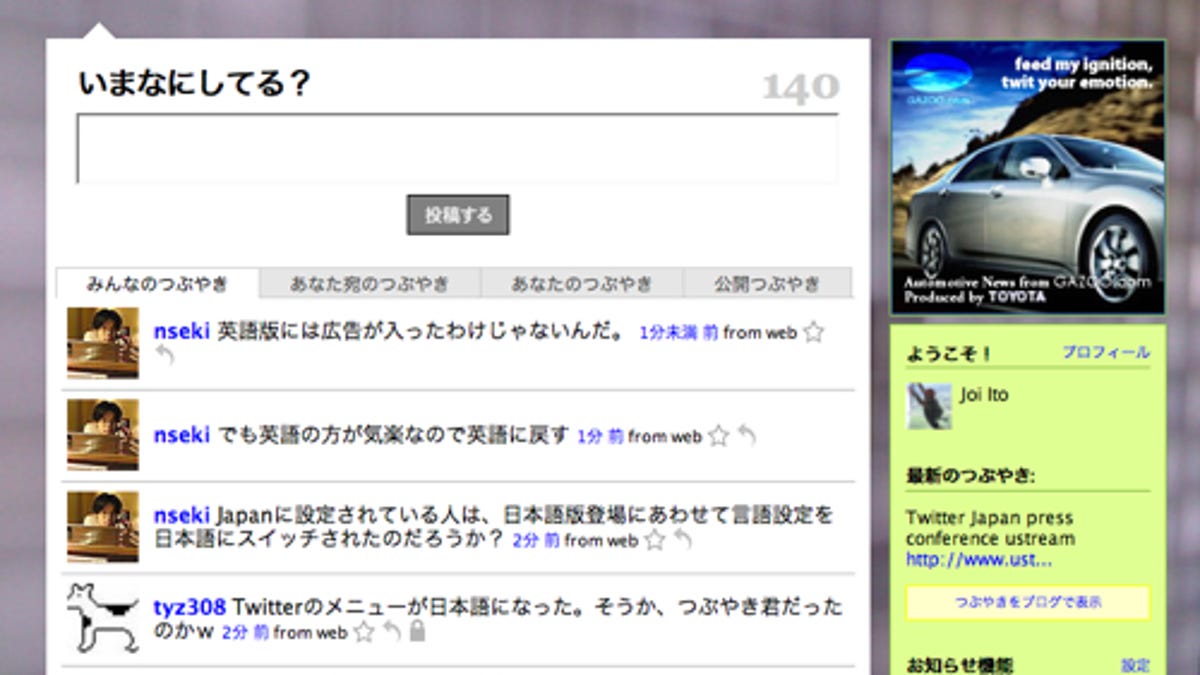Would Twitter Japan's success with ads translate?
Would users of the English-language Twitter site adapt to ads on a service that has been ad-free since its inception?

As Twitter Japan gets going upon its launch Tuesday night (California time), one of the things that observers are going to be most closely watching is whether or not Japanese users accept the ads that are on the new site.
That's mainly because one of the biggest questions--or maybe concerns is the proper term--about the main, English-language version of Twitter is that, because it's ad-free and free to use, it has no obvious business model.
In an interview, venture capitalist and Creative Commons CEO Joi Ito--who helped create Digital Garage, which was largely responsible for localizing Twitter for its Japanese version--explained that it was thought that implementing ads from day one was the way to go there.
Digital Garage invested in Twitter as part of the localization arrangement.
"Ads are important," Ito told me. "It's always harder to add ads later. So we're launching with them in Japan."
Until I saw what the Twitter Japan site looked like, I wasn't at all sure how ads would work. But after seeing an image of the site, which Ito posted on his own blog, I think it's actually a pretty light implementation, and one which users of the English-language site would be hard-pressed to get up in arms over.
Now, I'm not a proponent of ads. I love free online services. But as an editor of mine said this evening, it is sometimes hard to fathom how angry users get when someone tries to put ads on free sites. "How dare they try to make money," seems to go the thinking.
Well, there's more to it, of course. Obviously, many implementations of ad-supported sites are horrible. But meanwhile, Twitter is rolling along, building a user base of people who are becoming more and more dependent on it, and there doesn't seem to be a dime coming in, at least not from the public site.
And certainly, there have been rumblings here or there about ads coming. But an Internet truism seems to be that you simply can't add ads to a site that hasn't had them. There is no better way to chase away your users than to do that.
But I think the Twitter Japan ad experience is going to be very closely examined, because if people in Japan aren't put off by the ads, it's going to be hard to make the argument that people here would be, even though we're used to the ad-free model.
The question may eventually come down to whether people would rather have Twitter with ads or no Twitter at all.
I don't mean to sound alarmist, or to be an apologist for the ad model. But again, after seeing the Japanese site, I just can't see how having ads on Twitter's pages here would be all that much of an imposition. Sure, it would ruin the simple, clean, innocent feel of the site, but that can't last forever, can it? Google's home page still doesn't have ads, but its search results pages sure do.
Another interesting thing, meanwhile, about the Twitter Japan ad model is that it launched with spots from Toyota, which link to an opt-in Toyota Twitter feed.
I'm not sure exactly what would come through that feed, but it's not clear to me how receptive the audience will be to corporate marketing coming through feeds. On the other hand, there are already some examples of that here, at least in the form of political marketing, like that of Barack Obama's Twitter account.
Whether that model would fly for corporate accounts is very uncertain to me. I know that I personally would have no interest in a Dell feed, or a Microsoft feed. I'm trying to think of a company whose feed I would willingly subscribe to--and read--and I'm coming up blank.
Ultimately, then, the lesson here may be: Get ready to deal with ads on Twitter, in one form or another. I could well have this totally backwards, but I'm guessing not. Where Twitter loses me, however, is if they push ads into associated services like Twhirl.
But if ads ever do come, and they're just on Twitter.com pages, well, I'm going to cut the company a little slack.

